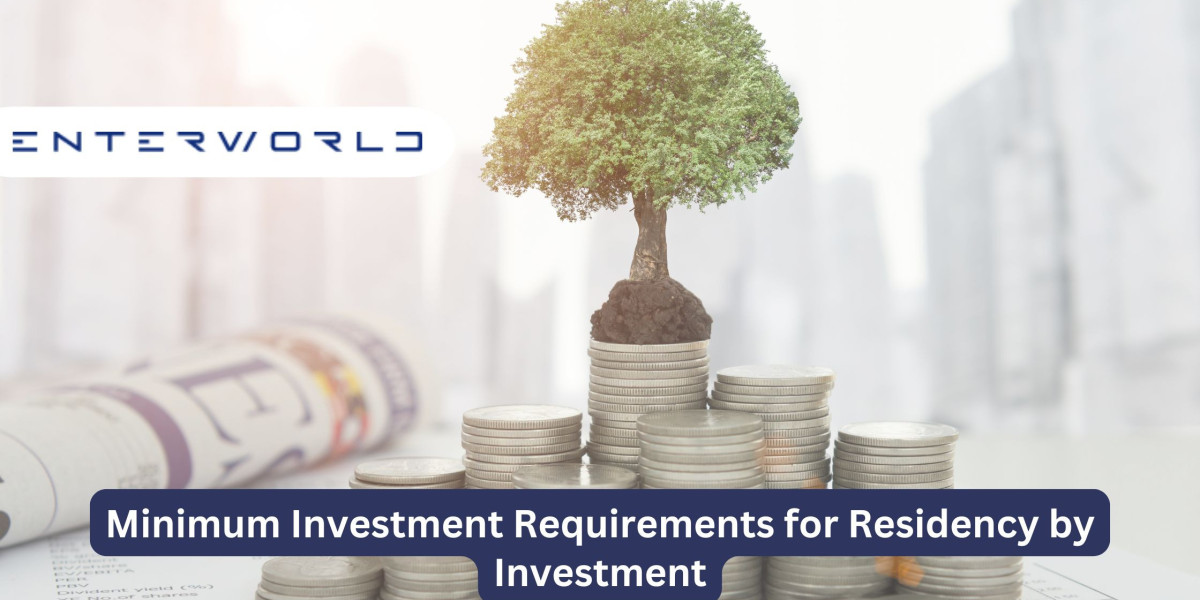Residency by Investment programs offer a pathway to secure legal residency in a foreign country by making a significant financial investment. These programs have become increasingly popular for individuals seeking better business opportunities, improved lifestyle, or greater international mobility. If you're considering applying for residency by investment, it's crucial to understand the minimum investment requirements, as they vary from country to country. Here's a breakdown of the key investment thresholds you need to know.
What is Residency by Investment?
Residency by Investment (RBI) programs allow individuals and their families to obtain legal residence in a country in exchange for making a qualifying investment. This can include investments in real estate, government bonds, businesses, or other economic initiatives that benefit the host country. In return, applicants and their families can often enjoy the benefits of residency, such as access to healthcare, education, and a better quality of life.
Citizenship by Investment programs, which provide a path to citizenship, Residency by Investment programs typically offer long-term residency, with some providing a pathway to citizenship after several years of residence.
Common Investment Categories for RBI Programs
Residency by Investment programs can require different types of investments. The most common categories include:
- Real Estate Investment – Purchasing property in the host country.
- Government Bonds – Investing in government bonds that offer a fixed return.
- Business Investment – Starting or investing in a business within the country.
- Capital Contribution – A financial contribution to a government fund or initiative.
Each category has different minimum investment thresholds, and some programs allow applicants to invest in more than one category to meet the required amount.
Minimum Investment Requirements by Country
Here’s an overview of the minimum investment requirements for some of the most popular Residency by Investment programs:
Portugal (Golden Visa Program)
- Minimum Investment: €280,000 - €500,000 (depending on location and type of investment).
- Portugal’s Golden Visa program offers a variety of investment options, including real estate and capital contributions. The minimum real estate investment can vary based on location, with rural and low-density areas offering reduced investment thresholds.
Spain (Golden Visa Program)
- Minimum Investment: €500,000 (in real estate).
- Spain’s Golden Visa requires a minimum of €500,000 in real estate investment, with no requirement to live in the country immediately. This visa provides the right to reside and work in Spain.
Greece (Golden Visa Program)
- Minimum Investment: €250,000 (in real estate).
- Greece offers one of the lowest minimum investment requirements for residency, allowing applicants to invest €250,000 in real estate to qualify for a Golden Visa.
Malta (Malta Residence and Visa Program)
- Minimum Investment: €250,000 (in government bonds), plus additional contributions.
- Malta requires a combination of investment in government bonds, a property rental or purchase, and a contribution to the National Development and Social Fund.
United States (EB-5 Investor Visa)
- Minimum Investment: $900,000 (in targeted employment areas) or $1.8 million (in other areas).
- The U.S. EB-5 program offers residency in exchange for an investment in a U.S. business. The minimum amount is $900,000 if the investment is made in a targeted employment area, which is typically a rural or high-unemployment region.
Canada (Start-Up Visa Program)
- Minimum Investment: No fixed minimum, but applicants must secure a minimum investment from a designated Canadian venture capital fund or angel investor group (usually between CAD $200,000 - $300,000).
- Canada’s Start-Up Visa Program does not require a specific investment amount, but applicants must secure funding from a Canadian investor group to be eligible.
United Kingdom (Tier 1 Investor Visa)
- Minimum Investment: £2 million.
- The UK’s Tier 1 Investor Visa requires a minimum of £2 million to invest in government bonds, share capital, or loan capital in active and trading UK businesses.
Australia (Significant Investor Visa)
- Minimum Investment: AUD $5 million.
- To qualify for residency in Australia under the Significant Investor Visa program, applicants must invest a minimum of AUD $5 million in government bonds, equities, or other eligible assets.
Factors Affecting Investment Requirements
While the figures mentioned above are the minimum investment amounts required, there are several other factors to consider:
Location within the Country: In some countries, the required investment amount may vary depending on whether you are investing in urban or rural areas.
Type of Investment: Certain types of investments, such as government bonds or venture capital, may have different financial thresholds or additional fees.
Family Members: Many RBI programs allow applicants to include family members such as spouses and children under a certain age. The cost of adding family members may increase the overall investment amount.
Processing Fees: Besides the minimum investment, applicants are usually required to pay government fees, legal fees, and other processing charges that can add up.
Conclusion
Residency by Investment programs offer a pathway to secure residency in some of the most desirable countries around the world, with varying investment requirements. The minimum investment amounts range from a few hundred thousand dollars to several million, depending on the country and type of investment.
Before deciding which Residency by Investment program is right for you, it's essential to assess not only the minimum investment requirements but also other factors like eligibility, benefits, and the long-term commitment involved. Consulting with an immigration lawyer or expert can help you navigate the requirements and make an informed decision.
Investing in a second residency can open doors to new business opportunities, international mobility, and access to better healthcare and education, making it a compelling option for many individuals seeking to enhance their global footprint.







